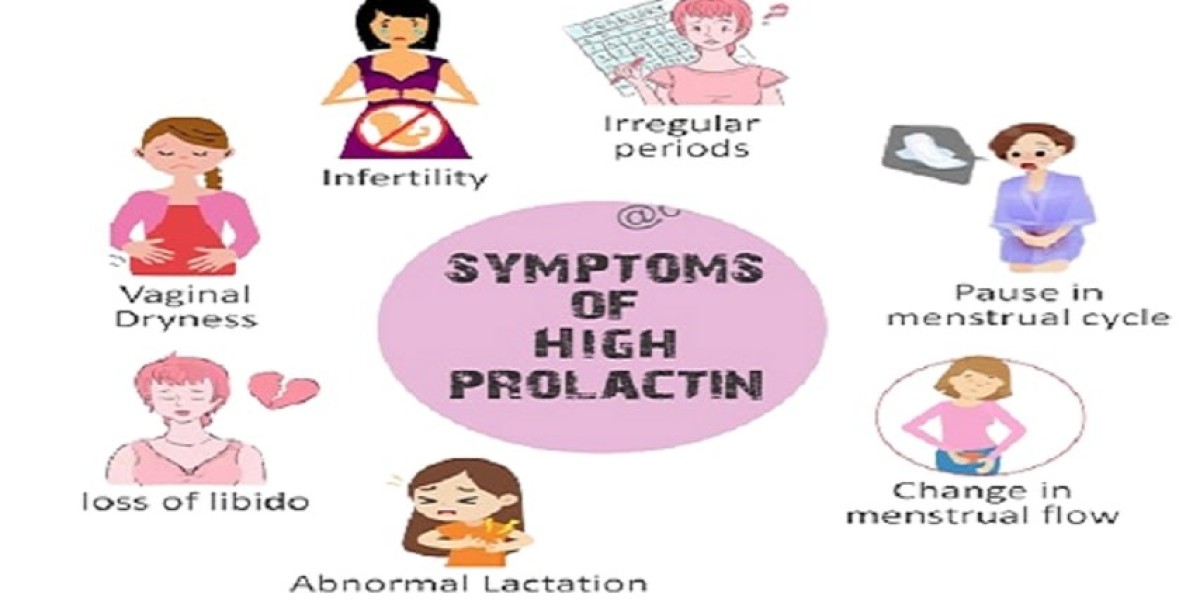Though it is most often linked with breastfeeding, the hormone prolactin is really vital for many other bodily processes, including nutrient absorption. Because abnormalities in prolactin levels may cause a host of health problems, keeping them within the prescribed range is crucial for ensuring general health. This article will explore the role of prolactin in the body and the best ways to naturally lower prolactin levels via food and lifestyle choices. By incorporating these wellness practices and nutritional ideas into their lives, individuals may enhance their general well-being and keep their hormones in balance.
A Thorough Explanation of Prolactin's Role and Control
The "milk hormone," or prolactin, is essential for many non-lactation-related biological functions. A hormone secreted by the pituitary gland, it influences metabolic rate, immune response, and ovulation. Elevated prolactin levels, on the other hand, may cause infertility, irregular periods, or even unwanted breast milk production in people who aren't pregnant.
Cabergoline Treat high concentration of the hormone prolactin in the blood is known as hyperprolactinemia. During breastfeeding, the pituitary gland releases the hormone prolactin, which primarily boosts milk production. Among the many health issues that may arise from an abnormal rise in prolactin levels are menstrual cycle abnormalities, infertility, and erectile dysfunction. Cabergoline eliminates these issues by regulating prolactin levels.
Hormone Balance and Vitamin B6
Pyridoxine, or vitamin B6, is crucial for hormone control, including prolactin. An essential vitamin that promotes its creation, neurotransmitters like serotonin and dopamine allow for its release.
Top Foods Rich in Vitamin B6 for Lowering Prolactin Levels
To aid in the body's natural regulation of prolactin levels, it is advised that you consume foods rich in vitamin B6. This might help maintain hormonal balance since vitamin B6 is abundant in bananas, tuna, lentils, and turkey.
zinc's function in controlling prolactin levels
Zinc has a major impact on the body's prolactin levels. A healthy hormone balance and the prevention of prolactin irregularities are ensured by an adequate intake of zinc.
Prolactin levels may be controlled by eating foods rich in zinc
Keep your prolactin levels steady by eating plenty of foods that are high in zinc. Zinc controls prolactin levels, which helps maintain hormonal balance. There is a lot of zinc in oysters, pumpkin seeds, lentils, and sirloin.
Learning How Hormones and Omega-3 Fatty Acids Are Regulated
The management of hormone levels, including prolactin, is aided by essential lipids like omega-3 fatty acids. In addition to potentially promoting hormonal balance, these beneficial fats are well-known for their anti-inflammatory effects.
Omega-3 Dense Foods for Prolactin Stabilization
One strategy for controlling prolactin levels is to eat more meals high in omega-3 fatty acids. Oily fish like salmon and mackerel, hazelnuts, flaxseeds, and chia seeds are good sources of omega-3 fatty acids. A better hormonal balance and general well-being may be possible with the help of certain of these lipids.
Foods Rich in Antioxidants for Controlling Prolactin Levels
I think it would be a good idea to look into antioxidants and their possible benefits in controlling prolactin levels. Antioxidants are crucial for hormonal balance and have a substantial impact on prolactin control. Eating meals rich in antioxidants may aid in preserving your body's hormonal equilibrium.
Cabergoline 0.5mg is used to treat a variety of illnesses that arise from excessive production of the hormone prolactin. It may be used to treat pituitary prolactinomas, which are tumors of the pituitary gland, as well as certain menstruation issues and issues with fertility in both sexes.
An Explanation of How Antioxidants Affect Hormone Balance
Oxidants function as a buffer, protecting your cells from free radicals and any damage they may do. Oxidative stress has the potential to upset hormonal balance, which in turn may cause prolactin and other vital hormone levels to be abnormal. Antioxidants are vital for protecting against free radicals, which may disrupt hormonal homeostasis.
Foods Rich in Antioxidants That Can Help Lower Prolactin Levels
What I like most about this part is the following: what meals might help maximize the impact of antioxidants on prolactin levels? It is recommended to consume kale, spinach, cherries, bell peppers, and other colorful fruits and vegetables. Dark chocolate, almonds, seeds, and green tea are some of the antioxidant-rich foods that may be part of a balanced diet on a daily basis. Enhance your hormonal health by incorporating these nutrients into creative culinary creations.
Advice on diet and lifestyle modifications to lower prolactin levels
Modulating prolactin levels is as much a function of one's lifestyle and eating choices as it is of what one eats. We will examine the ways in which you might get a better balanced hormonal system via the reduction of stress and the improvement of your diet.
Managing stress and hormone levels
Prolactin is one of the hormones that may be affected by stress. An increase in prolactin levels might be the result of hormonal irregularities brought on by long-term stress. By engaging in stress-relieving activities like yoga, meditation, or even just making time for oneself, hormone balance may be greatly improved.
Dietary supplements to control prolactin levels
In addition to eating enough foods that are high in antioxidants, following certain dietary guidelines may help with prolactin regulation. Consuming vitamin B6-rich foods, such salmon, mangoes, and legumes, may help regulate hormones. It is possible that the high zinc concentration in nuts, seeds, and oysters aids in the maintenance of proper hormone action. When combined with changes to your way of life, these dietary suggestions might form the basis of an all-encompassing strategy to lower your prolactin levels naturally.
In conclusion, leading a healthy lifestyle and eating foods high in vitamins, minerals, and antioxidants may help people naturally lower their prolactin levels. Improving hormone homeostasis and general health may be as simple as making more thoughtful decisions and eating healthier. Hormone balance and general health may both be greatly improved with very simple dietary and lifestyle changes. Please keep this in mind.








